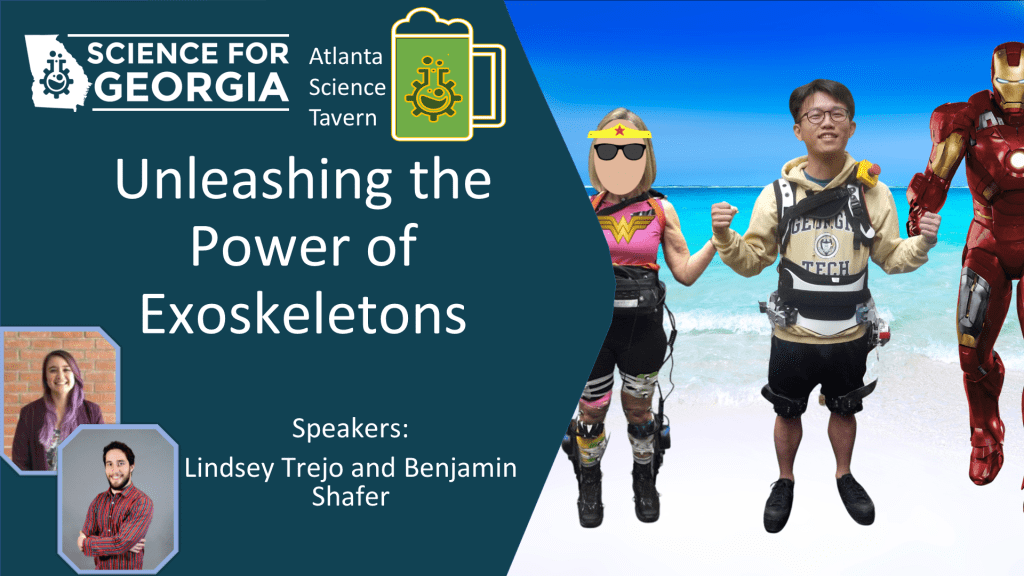February 25th, 2023
7pm – 9pm
In Person
Location: Manuel’s Tavern, 602 North Highland Avenue Northeast, Atlanta, GA 30307

Unleashing the power of exoskeletons: transforming the way seniors move
As you get older, many changes occur, especially physically, that can make life harder to enjoy. These physical changes can lead to walking slower, getting tired more easily during activities, and an overall reduction in strength. Our goal is to keep people mobile to allow them to fully enjoy their lives. To do that, we provide assistance using wearable robots called exoskeletons or exos (think Iron Man but only at the ankle or hip). Exoskeletons are like orthotic braces with motors to give you extra assistance.
There are multiple directions to look into how an exoskeleton can be studied. One way is to individualize the assistance to each user to try to improve outcomes like walking speed or energy usage during walking. To better understand how the exoskeletons influence walking, we can dive deeper, “under-the-skin” to the muscles and tendons. Both aging and wearing assistive devices change how much and how efficiently the muscles contract during walking. So the real questions we’re trying to answer are: Will these devices work for both younger and older people? Do muscle and tendon changes explain what exoskeleton assistance helps? We will share how we attempt to answer these questions and present what we have found so far at the talk!
Featured Speakers: Lindsey Trejo, Bioengineering PhD candidate at Georgia Tech and Benjamin Shafer, Robotics PhD candidate at Georgia Tech
Lindsey is a 5th year Bioengineering PhD candidate at Georgia Tech. She grew up in Lincoln, NE where she earned her bachelors in Biological Systems Engineering and Biochemistry at the University of Nebraska – Lincoln. She did her masters in Biokinesiology at the University of Southern California before landing at Georgia Tech for her PhD. Through the years she has studied assistive treadmills for children, the influence of fatigue in response to walk-training for stroke survivors, tendinopathy in professional ballet dancers, and now, exoskeletons for older adults. She is advised by Gregory Sawicki in the Physiology of Wearable Robotics Lab. Lindsey researches how our muscles and tendons change as we get older and whether ankle exoskeletons (motorized ankle braces) can restore walking performance. Lindsey specializes in the interaction of the body (muscle, tendon, energy to walk, etc.) with the exoskeleton’s assistance in both young and older adults in hopes to keep older adults independent longer. When she isn’t in the lab you can find her with her dog Ruby and fiancé Darrian. She enjoys creating and crafting, anything from crochet to working on cars and motorcycles.
Ben is a 5th year Robotics PhD candidate at Georgia Tech. Originally from Frederick, MD, he studied Kinesiology and Bioengineering at the University of Maryland – College Park where he captained the men’s rugby team. He has conducted research on long-term running injury, artificial ovaries, and nerve implants to return sensation and motor control to amputees using artificial limbs. Co-advised by Dr. Aaron Young and Dr. Gregory Sawicki at Tech, he currently conducts research using ankle and hip exoskeletons (i.e., wearable robots, powered braces). Ben specializes in individualizing walking assistance patterns, understanding why certain types of assistance are better than others, and translating these results to benefit walkers in the community. Outside of the lab – Ben enjoys rock-climbing, sports (volleyball, racquetball, basketball, tennis), eating at a plethora of Atlanta’s unique restaurants, concerts, and food/beer festivals. If there’s something fun to be done, you can count him in.
Agenda
February 25th, 2023
Manuel’s Tavern, 602 North Highland Avenue Northeast, Atlanta, GA 30307
This talk will be in the Eagle’s Nest area of the tavern.
6:30pm – Doors Open
7:00pm – Gather at Manuel’s
7:15pm – Talk start
8:00pm – Q & A
